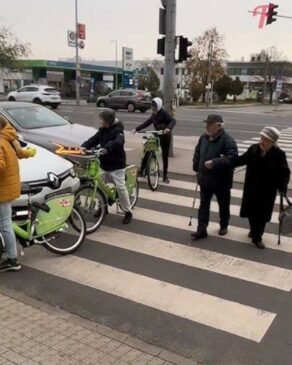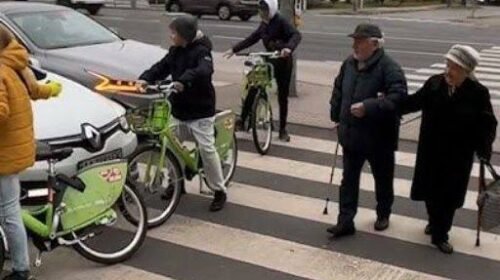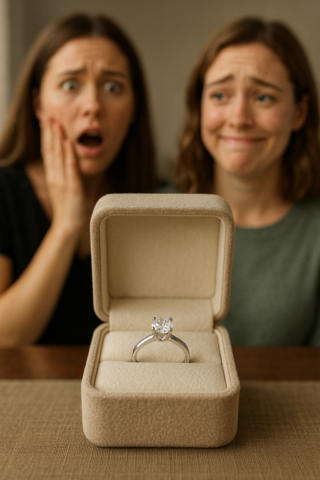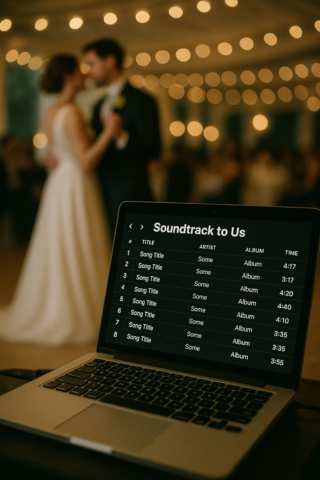I was on my lunch break, standing at the crosswalk, just zoning out and sipping bad gas station coffee. That’s when I saw them—three teenagers on bright green rental bikes, blocking the road like a wall of human traffic cones.
At first, I thought it was a prank or something—until I saw the elderly couple. The woman had a cane in one hand and was clutching her husband’s coat with the other like it was a lifeline. She looked… nervous. Like just stepping onto the street was something she had to psych herself up for.
And these teens—who probably could’ve just zipped past and ignored it—were completely locked in. One talking gently to the couple, one keeping cars at bay with a ridiculous traffic-guard stance, and the third making sure no one crossed too fast behind them.
The whole thing gave me chills.
When they got to the other side, I walked over and said, “That was seriously kind of you. Most kids your age wouldn’t even notice.”

One of them, this kid with a soft voice and oversized hoodie, just shrugged and said, “It’s the least I can do, it’s my fault she is like this.”
That stopped me. I blinked at him, not sure if I’d heard him right. “What do you mean?”
He looked uncomfortable, like he’d said too much. The other two exchanged a glance but didn’t say anything. Then the kid muttered, “It’s not something I talk about a lot… but we come every Friday. Same time. It’s our thing now.”
And before I could ask more, they rode off.
I stood there a long time after they left, the couple now safely halfway down the block, moving slowly and leaning on each other. There was something about the way the old man looked back and gave the kid a small nod—a gesture that said more than words.
That night, I couldn’t shake it. I kept thinking about what that kid said. “It’s my fault.” It rattled around in my head like loose change in a dryer.
So the next Friday, I went back to the same spot.
I brought better coffee this time and got there early. Sure enough, right around noon, the old couple appeared again, inching down the sidewalk toward the crosswalk. And a minute later, I saw those green bikes.
Same three teens. Same routine. One was already halfway off his bike, scanning traffic. Another was talking to the woman, gently cracking a joke that made her smile. The third? Already mid-stance, arms stretched out like some human stop sign.
Once the couple made it safely across again, I approached the hoodie kid. “Hey,” I said, “I hope this isn’t weird, but I’ve been thinking about what you said last week.”
He gave me a look like he was debating whether to bolt or not, but then he sighed. “You really wanna know?”
“I do.”
So he told me.
His name was Silas. A year ago, he was in the passenger seat of his older brother’s car. They were fighting about something stupid—some video game or who got to borrow the car the next day. It got heated. Silas threw a soda can at his brother while they were driving. Just a dumb reflex.
His brother flinched, swerved—and hit a woman crossing the street.
“She flew like a rag doll,” Silas said quietly, his hands shoved deep in his pockets. “I thought she was dead.”
She wasn’t. But she broke her hip, dislocated her shoulder, and suffered a mild concussion. After a few days in the hospital, she was discharged—but according to her husband, she hadn’t walked without help since. The trauma left her terrified of roads, of cars, of everything she used to do with ease.
“She didn’t press charges,” Silas said. “Didn’t sue. She just… forgave us.”
I didn’t know what to say. My throat was dry.
“She said, ‘You’re young. You’ll make mistakes. Just make them count for something.’” He looked down. “So now I do this. Every Friday. I asked if I could come help her cross the street. She said okay. Then my friends joined me.”
I glanced over at the other two. They were talking to the old man, laughing softly. It didn’t feel like punishment. It felt like… community.
I asked, “Why Friday?”
“That’s when she does her errands,” Silas said. “They go to the market and the post office. She won’t drive anymore, and the buses stress her out. So they walk. Always this crosswalk, always same time.”
Week after week, I started going back.
At first, I said it was for the story—I worked in local news and figured there might be something here. But that wasn’t the truth. I went because it felt like the world made a little more sense there. In that moment, with those teens and that couple, there was something solid. Real. Redemptive.
One day, it rained. Not a soft drizzle—pouring, sheets of it. I figured no one would be out. But when I got to the corner, soaked to the bone, they were all there.
The couple had ponchos on, walking slower than usual. The kids had plastic bags tied around their heads, still forming the same triangle of safety. Cars honked. One even splashed a huge puddle near them.
But none of them flinched.
Later, while drying off at a nearby café, I sat with Silas and asked him if the woman ever talked about the accident.
“Sometimes,” he said. “But mostly, she just asks how my week’s been. She’s kind. Always asks if I’m eating enough. Reminds me to text my mom.”
I couldn’t help but laugh. “You think she’s forgiven you?”
He looked at me like I missed the point. “She forgave me before I forgave myself.”
That stuck with me. It’s easy to say sorry. It’s harder to live like you mean it.
A month or so later, something changed.
One Friday, I saw only two kids at the crosswalk. Silas wasn’t there. His friends looked nervous, like they didn’t want to talk about it. They still helped the couple across, but something felt off.
I caught up with them afterward. “Where’s Silas?”
They hesitated. Then one said, “He’s in the hospital. Nothing too serious. Appendix.”
But the next Friday, he still wasn’t back. Neither was the week after that.
The old couple noticed. The woman asked me, “Do you know where our green-hoodie boy is?”
I told her. She nodded quietly and said, “Tell him I miss him.”
I did.
The following week, he returned—thinner, paler, but smiling. And when the couple saw him, it was like a movie reunion. The woman teared up. She dropped her cane. He rushed forward to catch her before she fell.
It was clumsy and beautiful all at once.
“I missed you,” she said, clutching his wrist.
“I missed you too,” Silas whispered.
But here’s where the twist comes in.
A few weeks after Silas recovered, the old man pulled me aside. He told me they’d been saving up for something. Said they didn’t have kids of their own, but they wanted to sponsor Silas for something big—college, or a program, or whatever he dreamed of.
I was floored.
They’d started a little fund after the accident, thinking maybe the insurance payout could help someone, someday. And after seeing Silas come back week after week, they decided he was that someone.
“He changed her life again,” the old man said, “but this time in the right direction.”
I helped them set up a meeting. At first, Silas refused.
He said he didn’t deserve it. Said he’d do this forever if it made things right.
But the woman held his hand and said, “You already did. Now go be someone who helps more people.”
Eventually, he accepted—with tears in his eyes.
He used part of the money to pay for community college classes and the rest to start a small non-profit. He called it Crosswalk Companions. Teen volunteers helping elderly folks run errands, cross roads, or just not feel invisible anymore.
And every Friday, he still goes back to that same spot.
Still brings his friends. Still waits for that couple. Only now, they don’t need as much help. The woman’s walking stronger. The man stands a bit taller. And sometimes, they even bring lunch to share.
Last I checked, the program had spread to four other cities.
All because of one stupid mistake… that led to a thousand good choices.
People talk about karma like it’s punishment. But maybe sometimes it’s also about healing. About second chances that ripple outward in ways you never expect.
So next time you see someone doing something kind and quiet, maybe ask them why. You never know the story behind it.
And if this story moved you, share it. Like it. Pass it on.
You might just inspire someone to turn their own mistake into something beautiful.



